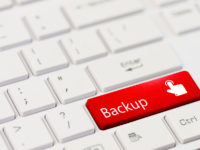In 2014, EMC estimated that 44 zettabytes of data would be created in 2020, and while this number will continue to grow, 30 per cent of people have never backed their data up. For small businesses, a data backup can be what saves the company. Cybercrime is estimated to cost Australian businesses up to $1 billion every year, and 60 percent of businesses hit by a cyberattack go out of business within six months.
World Backup Day serves as a reminder and motivator for people to back up their data to avoid disaster. So, avoid the possibility of being a data-loss April Fool this year by starting regular backups on 31 March.
Common ways to lose data are:
- theft
- hardware failure
- cyberattacks
- obsolete file formats
- natural disaster
- lost devices.
What information should be backed up?
A backup should not be the indiscriminate storage of all system files, it is important to prioritise the information and decide which data needs to be backed-up. For example, a folder containing financial records is not equal in value to a junk email folder.
Items that need to be backed up include:
- desktops and laptops
- smartphones
- tablets
- other wireless devices
- photos and videos on social networks.
How will the information be backed up?
Essentially, it’s a two-pronged strategy: hardware and software. Being proactive is key. Keep data safe and secure with remote devices, like external hard drives, in case devices become irreparably damaged or compromised. Meanwhile, update passwords frequently and ensure a decent anti-malware product is in place to help protect the software from cybercriminals.
It is also important to define where the data will be stored and backed up.
Local backup: An external hard drive that can be easily retrieved at home.
Cloud/offsite backup: An online backup service or hard drive securely placed in a different location.
Having both local and offsite backups provides peace of mind knowing that files are safe and secure. Note that syncing the contents of mobile devices with a vendor’s or provider’s cloud service does not count as an offsite backup, as someone who hacks the account associated with a device can likely delete all the content from the cloud, and even from the associated devices.
When will data be backed up?
It’s not enough to just back up once. If you consider that the average person generates 10GB a month, according to Cisco figures, all that info starts to pile up.
Backups should be performed periodically, but how often it will be conducted needs be defined. Every day? Every week? It will depend on how often the information is modified. For the young families whose first family snaps are all digital, the start-ups who keep their receipts and records online, every day should be Backup Day.
Who will perform the backup?
If there isn’t one already in place or correctly used, consider creating a company data backup and continuity plan. As backups are corrective measures, it is worth noting that their importance may depend on accompanying measures to prevent incidents that threaten your digital information.
For example, during a ransomware attack, a backup could be useful for the user to restore the “locked up” information, rather than feeling they have to pay the ransom. However, the presence of antivirus or other endpoint security software could directly prevent the infection, thus reducing the risks of not having all the necessary information in the backup copy.
Who will test if the backup can be restored?
Sadly, even companies and individuals who have invested the time and money to setup and perform regular backups have learned, to their cost, that making appropriate, regular backups is only the second most important part of a good backup regime. It may seem obvious in the abstract, but if you cannot easily access and restore files from your backup system, then the system is not really much use.
Hence, a major part of good backup planning and execution is ensuring that some staff are well-practised at restoring large volumes of lost data, and are actually able to restore necessary data as part of ongoing testing of the chosen backup system.
Nick FitzGerald, Senior Research Fellow, ESET














